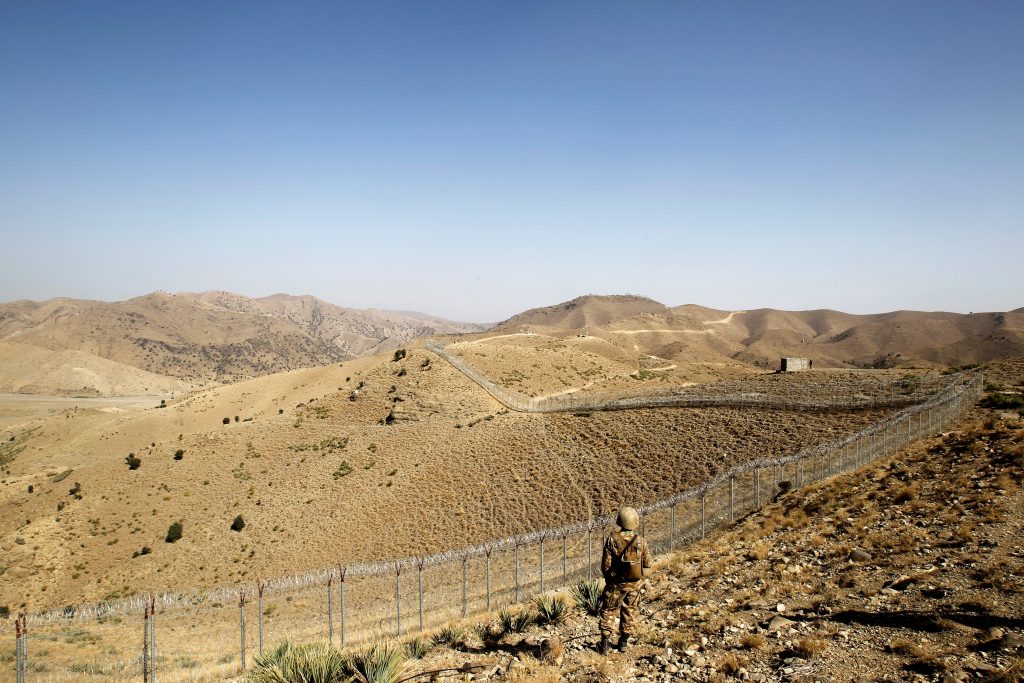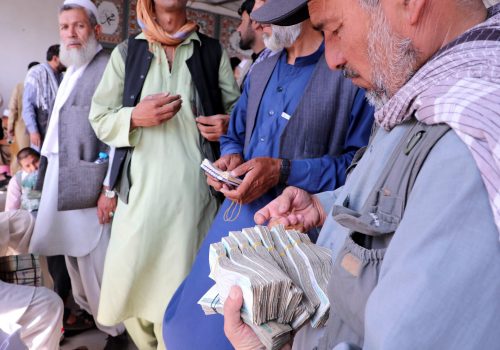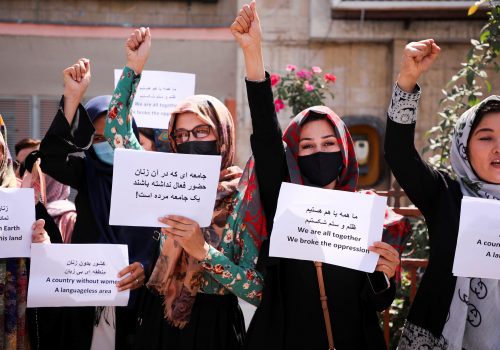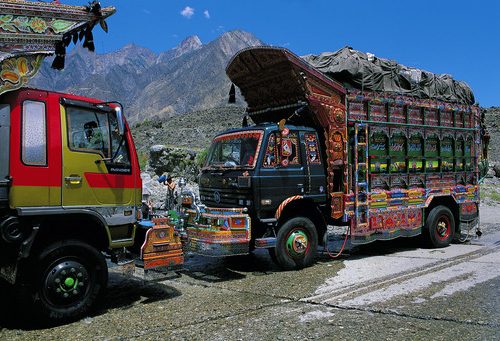Pakistan’s decades-long interventionist policy regarding Afghanistan has failed.
Islamabad’s long-standing objective—to have a dependent government in Kabul—has finally burned to the ground with the presently ruling Taliban who, instead of providing any strategic advantage or contributing to Pakistan’s security, has become a worrisome thorn in Islamabad’s side. Not only does this have grave implications for Pakistan’s security (such as through Kabul’s support for the Tehreek-i-Taliban Pakistan, or TTP), but it also necessitates a revised policy strategy to effectively deal with the situation in neighboring Afghanistan.
But first, how did we get here?
The Afghan Taliban have coddled the TTP since the Republic’s collapse
Since coming to power on August 15, 2022, the Afghan Taliban have taken four questionable steps in support of the TTP that are conspicuously against Pakistan’s interests and security.
- Operational support: The most significant of these steps is supporting the TTP and providing them a free field in Afghanistan. Soon after assuming power, the Afghan Taliban regime set free over two-thousand TTP members incarcerated in Afghan jails by previous Afghan presidents Ashraf Ghani and Hamid Karzai. After six years of relative stability in Pakistan when terrorist attacks actually decreased each year, attacks increased in 2021 by 56 percent. 294 attacks overall saw 395 people killed, and these attacks “coincided with the Afghan Taliban’s military offensive [which] started in May 2021 and reached the highest point in August 2021 when the Taliban took over Kabul” according to Islamabad-based think tank Pakistan Institute for Conflict and Security Studies.
- Pushing for Pakistani accomodation: The Afghan Taliban’s strategy of supporting and facilitating Pakistani talks with the TTP—as opposed to fighting the group militarily—has multiple geostrategic angles. The ramifications of this are that Pakistan must now contend with the facilitator of its talks with the TTP using relations with one of its prime security threats to force negotiations on the latter’s terms. Not only does this benefit the TTP as the Afghan Taliban’s brethren-in-arms (since the two have a long history of ties), but it also allows the Afghan Taliban to build a favorable image for themselves as peacemakers, putting Pakistan on the defensive so as not to meddle into Afghan affairs. Finally, and perhaps most powerfully, it might help to scratch off the label of the Afghan Taliban being Pakistani stooges.
- Ongoing refusal to recognize the Durand Line: The third significant anti-Pakistan measure of the Taliban regime in Afghanistan is not to recognize as settled the 2,640 kilometer—otherwise internationally recognized—border between the two countries known as the Durand Line. In an interview in February 2022, Taliban Acting Information Minister Zabihullah Mujahid said, “the issue of the Durand Line is still an unresolved one, while the construction of fencing itself creates rifts within a nation spread across both sides of the border. It amounts to dividing a nation” (referring to the Pashtun ethnic-linguistic group).
- Openness to engaging India: The statement by Mullah Yaqoob, Taliban Defense Minister, desiring that Islamabad’s arch-rival India train Afghan troops, is of grave concern to Pakistan. Such an overture holds significant weight and represents a stark change in tone seeing as Yaqoob is the eldest son of the movement’s founder, Mullah Omar. It is thus a major blow to Pakistan’s decades-long policy in Afghanistan to have a dependent regime next door, precluding Islamabad’s long-term goal of using Afghanistan for its regional—and particularly its anti-India—agenda. If Delhi agrees to train Taliban troops, this would mark the beginning of the end of Taliban dependence on Pakistan, and a major foothold for Indian influence on Pakistan’s western border.
Major implications for Pakistan’s security and territorial integrity
These factors have profound implications for the security of Pakistan. Historically, the underlying concern of Islamabad regarding Afghanistan has been the latter’s irredentist claims on Pakistani territory (regarding the disputed Durand Line), which the Taliban are now spearheading. Championing this revanchist stand would pose a grave security challenge to Pakistan’s territorial integrity, particularly when the Afghan Taliban are already glove-in-hand with the TTP.
The alignment of interests between these parties goes deeper: seeing as the Afghan Taliban and TTP are both Pashtun, it is thus concerning that—at the same time the Afghan Taliban continues to challenge Pakistani territorial integrity by rejecting the Durand Line—the TTP is concurrently pressing for a reversal to the merger of the former Federally Administered Tribal Areas (FATA) and Khyber Pakhtunkhwa (KP). Together, these efforts could mainstream the idea of a Pashtun-inhabited tribal borderland with a potential associated separatist movement. It also connects back to the Afghan Taliban’s double game in facilitating Islamabad-TTP talks while simultaneously enabling the TTP, with both angles designed to maintain leverage over Pakistan.
Furthermore, the interest expressed to India by the Afghan Taliban to train its troops represents a major blow to Pakistan’s decades-long goal in Afghanistan to have a dependent regime next door. In case India takes up this offer, the latter could gradually become dependent upon the former and growing relations between the two militaries would undercut the very influence Pakistani strategists have worked years to develop over the Taliban. Pakistan’s Afghanistan policy thus has not provided it with a puppet regime next door as originally intended—what former US Ambassador to Pakistan Richard Olson famously called Rawalpindi’s policy of “Strategic Depth.”
That said, it is precisely because of this context that the Afghan Taliban—in conjunction with the TTP—are now similarly in search of influence, or “Reverse Strategic Depth,” in Pakistan.
How should Islamabad respond?
While the threat posed by the Afghan Taliban is severe, Pakistan must respond carefully, bearing in mind the evolving geopolitical landscape of the region.
- Fence the border. Pakistani state security and social cohesion have had already been lacerated by the proliferation of militancy, terrorism, weapons, and Pashtun separatism from the Afghan war-conflict theatre in the last forty years. Pakistan must therefore further strengthen border fencing and surveillance mechanisms so that the cross-border movement of terrorists—particularly the TTP—as well as the proliferation of leftover weapons in Afghanistan into Pakistani territory be stopped.
- Negotiate with the TTP without the Afghan Taliban. Doing so would prevent Afghan Taliban leverage over Pakistan, which can currently enable the TTP and its operations in Pakistan depending on if Islamabad accedes to Kabul’s demands. As such, instead of appeasing them, Islamabad must straightforwardly present the TTP with an ultimatum: lay down their arms or otherwise face military action. In the meanwhile, Pakistan must use its influence to pressure the Afghan Taliban against having ties with the TTP, conveying to Kabul that the TTP poses a threat to its security and integrity. Once deprived of Afghan Taliban support, the TTP would have no other option but to negotiate with Pakistani authorities on the latter’s terms.
- Address the grievances of Pakistani Pashtuns. Pakistan’s war on terror has been entirely fought on Pashtun-inhabited regions, including KP, the former FATA region, and upper Balochistan, resulting in large-scale death, destruction, and displacement of millions of people. Incidents like the school attack in Peshawar which claimed the lives of at least 140 students is a case in point. It contributed to large-scale disaffection and anger among Pashtuns who consider themselves to have been victims of the war. Pakistan must put an end to discrimination and deprivation among its Pashtun population, dedicating funds for development, reviving livelihoods, and providing education.
To do this, the government should begin by revoking the merger of the former FATA region with KP, making FATA a new province. Separation and localization of FATA and KP’s governance would be instrumental in establishing industries, extending loans to enable young people to set-up small businesses including privately run schools and workshops, and generally enable a better social-political-economic milieu.
The difference, however, between this and the TTP’s push to reverse the merger is that the former would be an official, government-led policy serving the national interest, as opposed to an anti-state movement seeking to again have an unregulated territory from which to base terrorist operations in Pakistan (as it did prior to the merger). Revocation of the merger and making the region a province would enable inhabitants of the tribal borderlands to have their own elected legislative assembly that could formulate laws in accordance with local customs and traditions. - Open a dialogue with arch-rival India. That India and Pakistan have a long history of outsourcing their rivalry to regional conflicts is well documented. A mutual pledge between Islamabad and Delhi not to use the political vacuum and conflict in Afghanistan against each other could thus go a long way in addressing broader tensions in South Asia that foster proxy behavior. It is in the long-term interest of both countries to address issues directly as opposed to in roundabout ways. Here, India and Pakistan might find some common ground, despite the former being ruled by the Hindu extremist Bharatiya Janata Party and the latter being in the midst of its most serious political upheaval in decades. The security threat to the region emanating from Afghanistan could in time prove existential, and demonstrates the significance of Delhi-Islamabad cooperation insulated from domestic turbulence in both countries.
- Push for regional economic integration. Islamabad must support a true free trade policy with Afghanistan and India so that economic interdependence among regional countries can be realized. This would be in line with Pakistan’s avowed paradigm shift in foreign policy focus from geostrategic to geoeconomic. Regional interdependence also would neutralize nonstate terrorist groups like the TTP and compel the Taliban to reform and focus on economic rehabilitation of their country instead of engaging in destructive and destabilizing activity for the broader region. In recent years, Pakistan’s mutual trade with Afghanistan due to Islamabad’s myopic policies has come down from three billion dollars to just $500 million.
Both countries’ traders yearn to restore trade ties. Afghanistan, which does not have much export potential, has been dependent upon staple imports from Pakistan and other products due to their cheap prices and good quality. India—despite its political rivalry with Pakistan—has always been desirous of having open trade with Islamabad, demonstrated by its giving Most Favored Nation status to Pakistan in 1996 even though Islamabad never extended to India the same. Seeing as Pakistan is strategically situated between Afghanistan and India, it can use this goodwill and opportunities extended by its neighbors to serve as a bridge between the two countries and beyond with Central Asia.
Conclusion
Pakistan’s long-standing policy regarding Afghanistan has failed to achieve its core objective of having a pro-Islamabad regime in Kabul to counterbalance the threat from India. This policy failure has enabled and emboldened the Afghan Taliban to use Pakistan for the group’s own agenda: strengthen its stranglehold over Afghanistan via support from the TTP to the exclusion of all other Afghan political forces. This situation is against the interests of the people of both Pakistan and Afghanistan.
Pakistan must therefore revisit its Afghanistan policy and concentrate on strengthening security through measures like border fencing, talking to the TTP on its terms, addressing the genuine grievances of its Pashtun population, restoring purposeful dialogue with India, and pushing for intra-regional and cross-regional economic integration in which it could have an anchoring role.
(The writer is a Pakistan-based academic, security, political and policy analyst. He holds a PhD degree in International Relations and master’s degrees in Political Science, IR and Media Studies. He is alumnus of U.S. State Department prestigious IVLP) razamzai@gmail.com

The South Asia Center is the hub for the Atlantic Council’s analysis of the political, social, geographical, and cultural diversity of the region. At the intersection of South Asia and its geopolitics, SAC cultivates dialogue to shape policy and forge ties between the region and the global community.
Related content
Image: A soldier stands guard along the border fence outside the Kitton outpost on the border with Afghanistan in North Waziristan, Pakistan October 18, 2017. REUTERS/Caren Firouz



